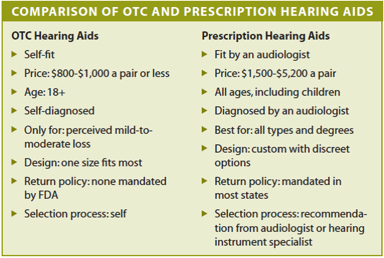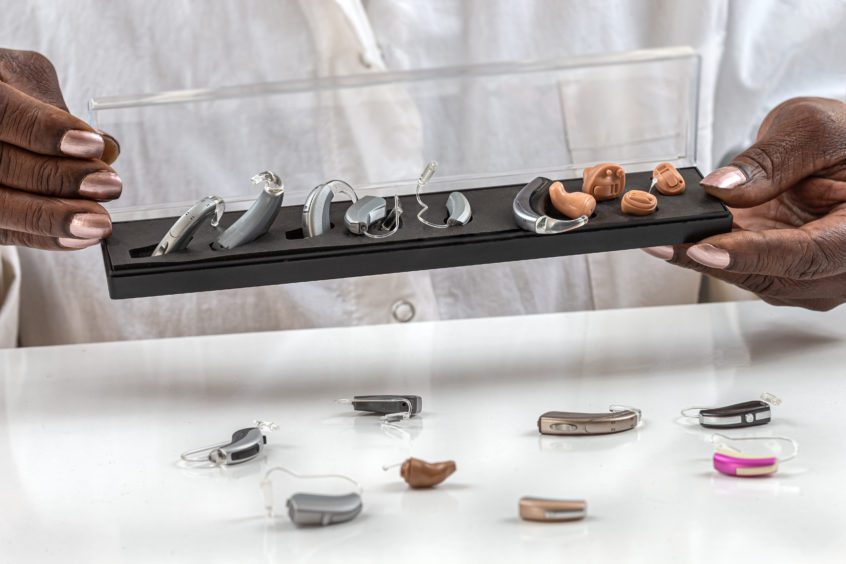With the recent entry into the marketplace of over-the-counter (OTC) hearing aids, many consumers are asking themselves, “Which do I need? Over-the-counter or prescription hearing aids?”
Probably the best place to start in answering that question is with a comprehensive hearing evaluation performed by a doctoral-level audiologist. A hearing evaluation isn’t required in order to purchase OTC hearing aids, but without one, how do you know if you actually have a hearing loss or how severe it is? All professional organizations, including the Academy of Doctors of Audiology and the American Speech-Language-Hearing Association, recommend a hearing evaluation before purchasing any kind of hearing aids, OTCs or prescription.
The evaluation the audiologist performs serves as the “blueprint” for your hearing aid prescription, and tells you whether your hearing loss is mild, moderate or severe.
When an audiologist examines your outer ear with an otoscope or video otoscope, they can observe any damage caused by the use of cotton applicators (“Q-tips”), trauma, or chronic infection. An audiologist can also observe the condition of the ear drum and determine whether the ear canal may have a buildup of earwax causing a hearing loss.
After considering a patient’s history and performing a visual inspection of the outer ear, the audiologist can perform an audiological evaluation composed of a series of tests. These tests may include but are not limited to:
- Tympanometry to assess the status of the middle ear.
- Pure tone thresholds by air conduction and often by bone conduction to determine the degree and type of hearing loss.
- Tests of speech threshold and speech recognition to assess comprehension of complex signals.
- Special tests of auditory function, such as otoacoustic emissions, brainstem auditory evoked response (BAER), or balance testing.
If testing indicates your hearing loss is in the mild-to-moderate range, you can consider OTC hearing aids. But if your test indicates you have a more severe hearing loss, you’ll need to purchase the more sophisticated technology only available in prescription hearing aids.
In addition to testing hearing and balance, an audiologist also can:
- Recommend, service, and adjust hearing aids.
- Recommend and provide assistive listening devices (products to enhance telephone conversations, television viewing, etc.).
- Provide tinnitus assessment and management.
- Provide education regarding the effects of noise on hearing and prevention of hearing loss.
- Deliver counseling and aural rehabilitation (counseling, education, auditory training/exercises)
Some audiology practices, including Associated Audiologists, also offer OTC hearing aids that they have investigated and recommend. For a fee, they can assist with fitting and programming OTC hearing aids, as well as monitoring your hearing.
The chart below summarizes the major differences between OTC and prescription hearing aids.


Remember, while OTCs are being marketed as a less expensive alternative to prescription hearing aids, they also generally are not covered by insurance plans, so if you are on the fence about whether you need OTCs or prescription hearing aids, you also should check into your insurance benefits and whether you have coverage for prescription hearing aids. Associated Audiologists has specialists who can investigate this important question for you, and they also can submit a claim with your plan if you choose prescription hearing aids.
In addition, remember that you’ll be responsible for fitting OTCs if you buy from retail stores or online, and these devices may not be returnable. Prescription hearing aids are fit and programmed by an audiologist using the results of your hearing evaluation. Plus, returns are mandated by state law.
If you have more questions about whether OTC or prescription hearing aids are right for you, check out our web page dedicated to this topic.



